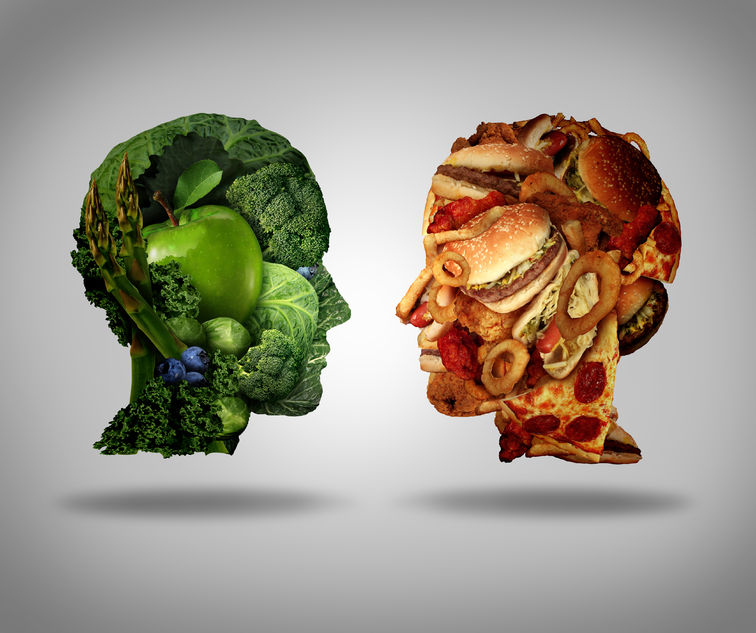Modern life has become increasingly stressful. We’re constantly juggling so many things and not switching off properly. With all this rushing around many of us grab quick fixes to get through the day and don’t prioritise diet. But food can have a profound effect on mental wellbeing.
Good nutrition has been proven to boost IQ, improve mood, mental stability and memory plus alleviate stress and anxiety. Here are our top 5 tips for improving mood with food:
Focus on the gut: The gut is responsible for absorbing the nutrients our brains need to function properly. Healthy gut cells and a good balance of bacteria are key to ensuring we’re getting all the nutrition we need.
The gut is also central to maintaining the balance of the brain’s chemical messengers such as serotonin. If you’re feeling low, anxious or stressed you may have a disrupted gut and therefore low levels of the building blocks needed to make these messengers.
Many people find that certain irritants, such as gluten, aggravate symptoms so a good place to start is by removing it from the diet for a week and see if there are any improvements. Other common allergens include dairy, eggs, soy, yeast and alcohol. A registered Nutritional Therapist can help identify and remove intolerances that may be leading to brain fog, depression and anxiety.
Choose:
For probiotics: yogurt, fermented foods such as sauerkraut, pickles, miso, kefir or kombucha, olives, asparagus, artichoke, onions, garlic, leeks, chicory. You could also consider a good quality probiotic supplement.
For gut health: bone broth, ginger, turmeric, leafy greens, kale, broccoli, squash, apples, pears and oats. Our turmeric tea combines a number of gut-healing nutrients, as does our butternut squash soup.
Control stress and sugar levels: Stress causes a number of biochemical imbalances that directly affect mood. Not only do stress hormones affect the way we eat – either binge eating or not eating at all – but they negatively impact blood sugar levels.
Regulating blood sugar levels is probably the most important consideration for regulating mood. All carbohydrate foods are broken down into glucose and our brains run on glucose. If our sugar levels are all over the place, so is our mood and this has been linked to depression, anxiety, fatigue and poor memory.
Choose: whole grains and always combine them with protein and healthy fats to slow the release of sugar down. Avoid any refined carbs (white bread, white pasta, potatoes, added sugars) and focus on fibre-rich foods such as oats, sweet potatoes, spelt, buckwheat, quinoa and beans. Leafy greens such as spinach and kale are packed full of magnesium and B vitamins that help regulate stress hormones and promote feelings of wellbeing.
Boost essential fats: Our brains are 60 percent fat. The ratio of fats in the brain dictate how fluid our cell membranes are and maintain connections between brain cells. Eating too much saturated fats from processed or fried foods and excess meat or dairy and not having enough omega 3 fats can harden the membranes so messages don’t get through to the brain. Study after study show how important essential fats are to mental health with some showing that supplementing omega 3 fats can improve mood more than antidepressant drugs!
Choose: oily fish (salmon, mackerel, herring, sardines, tuna) nuts (walnuts) and seeds (pumpkin, hemp, chia and flax). Limit veg oils, processed or fried foods and go for pasture fed meats and organic milk and butter that have a far better fat ratio. You can also supplement EPA and DHA
Increase serotonin: Mood and alertness are all affected by different neurotransimtters – chemical messengers that talk to the brain and dictate how we think and feel. Serotonin is known as our feel good, happy neurotransmitter and most anti-depressant drugs work by increasing the availability of serotonin in our brain.
Serotonin is made from the amino acid tryptophan so ensuring good levels of dietary tryptophan through protein-rich sources can help boost levels. But its not as simple as that as tryptophan competes with other amino acids so a trick is to eat a small amount of carbohydrate such as an oatcake, banana or nut butter around 2 hours after a meal. This helps tryptophan to travel to the brain where it is needed.
Other ways to increase serotonin are through sunlight, exercise and reducing stress. Exercising outdoors gives a double whammy as it helps to boost vitamin D levels (vital to brain function and health) and we get the benefit of mood-boosting exercise.
Choose: eggs, fish, cheese, meat, poultry, seeds, nuts, soy, oats, chickpeas, bananas.
Top up B vitamins: Studies have shown a deficiency in B vitamins (particularly B6, folate and B12) can be linked to depression. B vitamins are needed for healthy nerves and brain cells and they are also critical for dealing with stress and anxiety. Although there are lots of good food sources of B vitamins including nuts, seeds and vegetables, B12 is predominantly found in meat, fish and eggs so vegetarians and vegans may need to keep an eye on their levels.
Choose: meat, poultry, fish, dairy, eggs, whole grains such as oats, brown rice, rye, barley, quinoa, spelt, buckwheat, almonds, beans, green leafy veg, asparagus and broccoli.
Following the above advice helps to boost mood and helps the body to deal with stress and anxiety by providing it with the raw materials it needs to function properly. If you would like to investigate possible deficiencies or want support with any mental health issues we would advise you contact us to seek further advice.
We hope you enjoy this blog post, let us know your thoughts in the comments below or on social media – we’re on Twitter, Facebook, Instagram and Pinterest. And don’t forget to sign up to our newsletter to receive a monthly update of our recipes, nutrition tips and expert advice.





